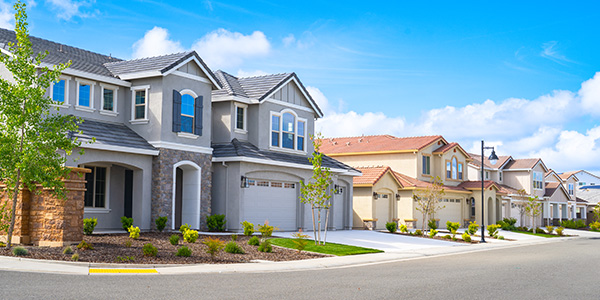Homebuyers
Pros and Cons of Buying a Condo
August 31, 2023
Are you interested in buying a condo? If so, you've come to the right place. Buying a condo is somewhat like buying a single-family house, but there are some differences you should be aware of. There are many pros and some cons to buying a condo and it’s important to be fully aware of every angle before making a decision. So, if you or someone you know is looking to make a condo their new home, read on for much more information.
What is a Condo?
Before we go any further, it’s important to discuss what a condo is. A condo is different from a single-family house. While both are single-family residences, a single-family house is likely a standalone building, whereas a condo is typically part of a larger building shared with other residents. But condos are different from apartments.
In simplistic terms, think of a condo as an apartment you own. In those instances, residents often share walls with their next-door neighbors. Condos have common areas like many apartment complexes, but with a condo, the common areas are jointly owned by other condo residents.
It should be noted that some condos are detached units.
Are Condos Worth Buying?
It depends on what you’re looking for.
Given the housing market or area of town where you’re looking to purchase a home, condos may be the most prevalent option. In downtown areas, for example, condos are a common choice. Most downtown areas don’t have single-family houses next to office buildings and shops, but condo buildings are often mixed in with these convenient urban amenities.
Condos offer many buyers an opportunity to live in a location they might not otherwise be able to without sacrificing convenience or their preferred lifestyle in favor of homeownership. Owning a condo can be a viable alternative to renting an apartment, especially considering that as a condo owner, you can build equity and often take advantage of tax deductions on the mortgage interest.
Another unique feature of condo living is that most condos will have a governing board that oversees how the condominium community operates and is maintained. These homeowners associations manage the complex and handle any rules or guidelines for the community. They are also responsible for the upkeep of the common areas that are owned by all the residents of the building.
Is It Better to Buy a House or a Condo?
If you’re ready to buy a property, the decision to purchase a condo vs. a house is a big one. There are many reasons a person might buy a condo instead of a typical single-family house.
Condos can be less expensive than single-family houses, as condos tend to be smaller. Additionally, unlike houses, condos don’t come with any land. Each of those typically makes condos a less expensive option.
Condos tend to be popular for first-time homebuyers due to their affordability, and among retired people, as a condo community will often provide services specifically catered to them.
Condos also typically have several amenities available to residents that single-family homeowners might not have access to, like a pool, theater room, community events, etc.
Maintaining a single-family home generally requires more upkeep than a condo, like yardwork or other maintenance. Condos have the advantage of reducing your responsibility to your space, freeing up your time. In addition, owning a condo can reduce costs since expenses are shared.
How is a Condo Different from an Apartment?
Condos and apartments are similar in that they are usually units within a building, with other residents or owners next to, above, and below them. But condos and apartments are not the same.
The main difference between a condo and an apartment is who owns the unit itself, and as a result, who has control over what happens to that unit. With a condo, you are the owner of the unit, but with an apartment, the landlord is the owner.
When you buy a condo, the unit is yours and you can make whatever changes you like, as long as they follow the HOA rules and don’t infringe on another owner’s unit. Put another way, you can’t expand your condo and take over someone else’s space.
However, inside the unit, you can redo the kitchen, update a bathroom, install new flooring, paint the walls, put up wallpaper, or do any number of other home improvement projects. You don’t have that luxury in an apartment. You may be able to paint the walls, depending on your lease agreement, but any other changes are likely out of the question.
In an apartment, the landlord has the final say and they can make changes if they want to. They can also raise the rent if they want to when your lease expires. In a condo, if you have a fixed-rate loan, your mortgage payment will remain the same for the life of the loan.
If you enjoy the benefits of apartment living like the communal feel, the shared spaces, and in many cases, the preferred location, but want to build equity for the future, then a condo might be worth exploring.
Is a Condo the Same as a Townhouse?
Some people may think that a townhouse and a condo are the same thing, but they’re not. However, they do have some similarities. They’re both typically single-family homes that are attached to other homes around them, rather than being standalone structures like a traditional single-family house. Condos and townhomes are also properties that people buy instead of rent.
But there are differences between condos and townhouses. Condos are somewhat like apartments in that they are units within a larger multi-unit building, but a condo is a unit that you own. A townhome is usually larger than a condo and more like a traditional single-family house, but townhomes are often attached to other townhomes.
Think of a townhome as a “regular” house that’s connected to other houses, sometimes in a row, in a building style that maximizes the available land to build as many properties as possible.
Townhouses and condos are both popular among first-time homebuyers as they can carry smaller price tags than traditional single-family homes. Condos and townhomes are also more prevalent in certain parts of the country and even within cities themselves based on the geography and demographic breakdown of the area.
Townhouses and condos each carry their advantages and they’re each different in their way from a traditional single-family home.
There are other benefits to buying a condo as well. With that in mind, let’s take a look at the pros and cons of buying a condo.
Pros of Buying a Condo
Equity
If you are partial to apartment living due to the amenities and the sense of community you can build, but you are also interested in building for your financial future, condo life may be the right choice for you. When you buy a condo, you can build equity. Home equity is the financial portion of the home the owner truly owns. Equity can increase over time as you pay down your mortgage. Equity can also increase if the property value rises. Then, if you decide to sell the condo, you can use the equity you’ve built to help you buy your new home.
Affordability
Condos tend to be less expensive than their single-family house counterparts, and they can provide homeownership opportunities for more buyers.
Location
Many condos are built in popular, high-demand areas and downtowns, so if you want to be in the heart of a city or within walking distance of many different amenities, a condo might be a good option.
Security
Many condos offer security features such as a call box, doorman, or guard service. Living among a group of neighbors also provides a sense of security when you are away from your condo.
Improvements
Unlike an apartment, if you own a condo, it’s yours. You can make home improvements you like to your unit. Want to redo the kitchen or the bathroom? You can do it. Want to paint a bedroom? You can do it. You aren’t beholden to whether the apartment management company wants to make improvements or not.
Maintenance
If you’re not inclined to do yard work or handy with tools, a condo may be for you. Many condo complexes hire professionals to maintain the exterior and the common areas.
Amenities
As a condo owner, you are co-owner of any common areas that the condo building has to offer. Many buildings offer tennis courts, swimming pools, a gym, a theater room, and other amenities that you might not be able to afford on your own.
Possible Cons of Buying a Condo
No Land Ownership
When you buy a condo, you won’t own the land beneath it. Instead, you share an interest in it with the other condominium residents. When you buy a house, you are also buying the land the house sits on. Depending on your preference, this might mean spending less overtime on home maintenance.
Fees
The common areas of a condo building are certainly nice, but it costs money to maintain them. As a condominium resident, you will likely be required to pay a monthly fee that goes toward the maintenance and repair of the common areas. There may also be an additional fee tacked on for any larger repairs and renovations to those areas as well, but you will also get to enjoy these amenity upgrades.
Community Association Rules
Since you'll be living in a community with a community board or association that helps to govern it, you will have to abide by the rules of the condo. Rules may include whether you can have pets, what types of pets you may have, how and when the shared facilities may be used, and rules about visitors or guests among others. You may also elect to participate in your community board or association.
Parking
Depending on the location, a condo may come with limited (if any) parking options. Some condos only allow one assigned parking space per unit, which could be an issue if your family has more than one car.
Storage
Given that condos are typically smaller than houses, you will likely have much less space for storing items in a condo compared to a house. Some condo units come with designated storage space, but those spaces may be small and not able to hold larger items.
With that in mind, let’s take another look at whether buying a condo may be a good decision for you.
Is Owning a Condo Worth It?
Whether you want a single-family house or condo is really up to each person or family individually. There are benefits for each one, but condos are an appealing option for first-time homebuyers as condos will help them build equity that they can use to buy their next home. Buying a condo may also be the best option available if you want to live in a certain area and buy a piece of property instead of renting.
Given that, let’s take another quick look at the pros and cons of buying a condo:
|
Pros |
Cons |
|
|
|
|
|
|
|
|
|
|
|
|
|
|
Condo Loans
If you are interested in buying a condo, you should be aware that there are some differences between condos and single-family houses when it comes to the mortgage process.
Compared to a loan for a single-family house, a condo loan may have a few additional considerations.
One big difference between condos and single-family houses is if you choose to get an FHA loan.
If you’re thinking about getting an FHA loan for your condo, it must be listed on HUD's FHA-approved condominium list. The FHA has a list of criteria that a condominium project must meet before it can be approved to allow residents to use FHA financing to purchase or refinance a condo.
If you choose to pursue a Conventional loan, the rules and guidelines will vary from lender to lender as it will depend on their investor guidelines. In specific cases, investors will require that at least 50% of the units in the building are owner-occupied as a primary residence or second home. There may also be various HOA-related rules that need to be abided by in the loan, depending on the investor.
If you’re ready to buy a condo, be sure to work with a lender that has a dedicated team for condo approvals, like New American Funding. Our team will make the process easy, so you can enjoy shopping for your home! Use our Home Affordability Calculator to find out how much you can afford!






 Smart Moves Start Here.
Smart Moves Start Here.